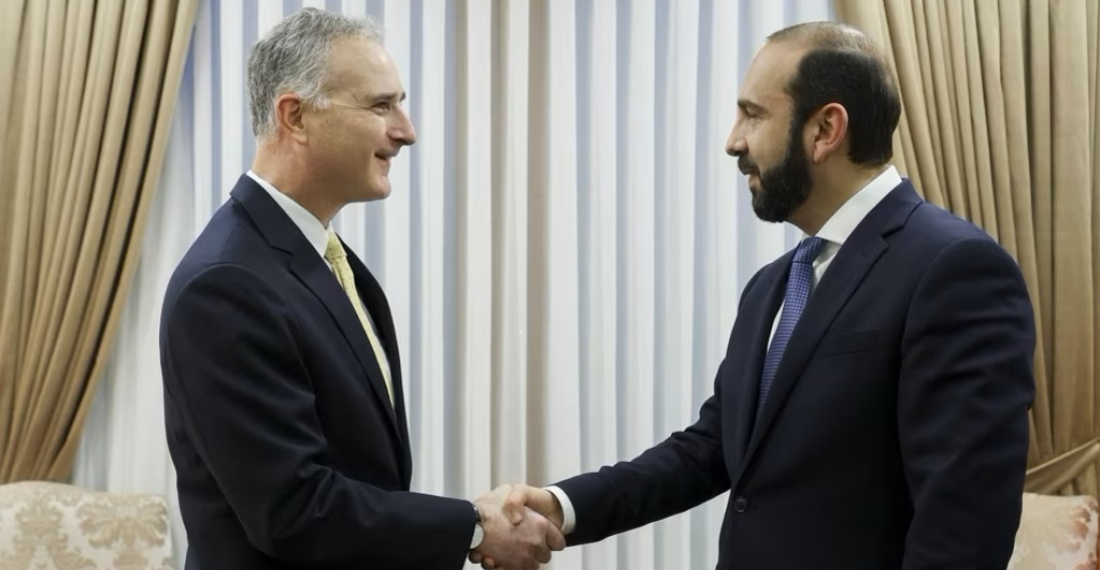- Armenia-Azerbaijan Strategic Expert Platform: Members emphasise the importance of the present moment for the South Caucasus and call for the momentum to be used for the long-term peace and prosperity of the region
- Thursday Interview: Dr. Anar Valiyev
- Food insecurity in Somalia has nearly doubled in the past year
- Türkiye evaluating potential measures in case of a US-Iran conflict
- European Parliament reaffirms support for Ukraine and EU Path
- EU moves ahead with Ukraine loan preparations despite Hungarian block
Opinion: Baku wants an agreement with Armenia without mediators

On January 8, US Senior Adviser on Caucasus Negotiations Louis Bono visited Yerevan, engaging in discussions with local officials regarding the Armenia-Azerbaijan peace process. The Armenian side reported that one of the issues discussed during this visit was the organization of a meeting of the Armenian and Azerbaijani foreign ministers in Washington. Unlike his previous visits to the region, this trip omitted a visit to Baku, suggesting that it either wasn’t planned, which is unlikely, or that the Azerbaijani side was not open to receiving him. Recent developments between Baku and Yerevan, along with the evolving dynamics of mediator involvement, indicate that Azerbaijan has grown more cautious and skeptical about the role of third parties in the Armenia-Azerbaijan process. As a result, Azerbaijan has advocated for bilateral meetings between the two countries. Baku’s position is primarily related with the potential geopolitical fallout of the upcoming peace deal with Yerevan.
Azerbaijan is concerned that the peace talks with Armenia are perceived by competing major powers as a tool serving their own strategic interests. Baku, therefore, aims to navigate this process meticulously, avoiding being positioned as a pawn on the geopolitical chessboard. This necessitates prioritizing the interests of the local states and refraining from antagonizing any major power by allying with one side. The confrontational context of the Russia-West relations is a big source of concern for Baku as any deterioration of the relations with either side is at odds with the economic and political interests of Azerbaijan. Hence, Baku seeks a peace treaty that would address only the disputes between Armenia and Azerbaijan; not a treaty that would be of a more geopolitical project attempting to change the power balance between the major powers in the South Caucasus.
Towards this end, Baku pursues two major objectives. First, the peace treaty negotiations are preferred to be conducted at the bilateral level between Armenia and Azerbaijan. On 28 December, the Foreign Minister of Azerbaijan announced that Baku proposes to hold a meeting of foreign ministers of the two countries at the border. In the wake of an earlier meeting of the border delimitation commissions of the two countries at the border on 30 November, it would be another step towards normalization if their foreign ministers also meet at the border, followed by a meeting by the political leaders. It is not clear why Armenia has so far refused to hold bilateral talks on peace treaty, while agreed to such talks on the delimitation issue. The next meeting of the border commissions scheduled to take place at the border this month shows that this format works in practice and can be extended to other levels of bilateral talks. The utility of bilateral contacts is also confirmed by the fact that the landmark deal between the two countries concerning the swap of prisoners last month was possible with no involvement of third parties.
As part of this approach, Baku also rejects the calls for the establishment of an institute of guarantors comprising of third countries in the peace treaty. Instead of this, Baku proposes to form a bilateral commission of the two countries to deal with any dispute that may appear in the future. This formula of “guarantees but not guarantors” is meant to ensure that the Armenia-Azerbaijan relations will not be a subject of great power dynamics in the future.
Secondly, Baku remains committed to the trilateral statements signed by the leaders of Armenia, Azerbaijan, and Russia in 2020-21. One major issue that is now addressed by these statements is the re-opening of regional transportation links. Armenia has recently rejected the trilateral statement of 9 November 2020 that envisages the provision of “unimpeded” access between the western part of mainland Azerbaijan and Nakhchivan exclave as well as the deployment of Russian border guards to this land passage, that is called “Zangezur corridor”. Armenia rejects both proposals; this poses challenges to the peace talks with Baku and provokes further instability in relations with Russia. Hence, Azerbaijan expects Armenia to fulfil its commitments under the trilateral statement without creating a geopolitical crisis over this corridor.
Against this background, the reluctance on the side of Azerbaijan to re-internationalize the peace talks and Baku’s lack of enthusiasm concerning the new round of talks in Washington is understandable. But this situation is also affected by the policies of the United States vis-à-vis Azerbaijan. The re-introduction of the 907 amendment of the Freedom Support Act which prohibits military aid to Azerbaijan, the inclusion of Azerbaijan to the religious freedom watchlist, and the threatening statements against Baku’s decision to open an alternative via Iran to the Zangezur corridor, among others, have damaged the image of the United States as a neutral mediator between the two South Caucasian republics. Nonetheless, Baku's insistence on bilateral talks between Armenia and Azerbaijan, excluding mediators, reflects a more fundamental intention – to protect the region from the geopolitical rivalries and safeguard regional peace and security.








